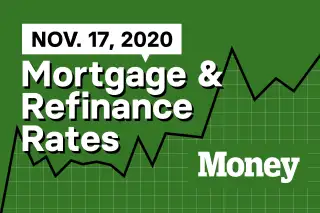Here Are Today's Best Mortgage & Refinance Rates for November 17, 2020

For the eleventh week in a row, more homeowners exited the mortgage forbearance program set up by the CARES Act in March than entered. The number of homeowners taking advantage of the payment deferral program is about half what it was at the peak.
Today's Mortgage Rates
The average rate for a 30-year fixed-rate purchase mortgage was 3.379% on Monday. The average rate for a 30-year refinance was 4.268%.
Money's mortgage rates include data from over 8,000 lenders across the United States and are updated daily. These rates include discount points and represent what a borrower with a 20% down payment and 700 credit scores — roughly the national average FICO score — would have been quoted.
| Mortgage Rates for November 17, 2020 |
| Loan type | Average Rate |
| 30-Year Fixed Loan | 3.379% |
| 15-Year Fixed Loan | 2.467% |
| 30-Year FHA Loan | 3.349% |
| 30-Year VA Loan | 3.396% |
| 30-Year Jumbo Loan | 3.69% |
Source: Money | Date: Nov. 16, 2020 | Rates Assume a Credit Score of 700
Mortgage rates vary from state to state. On Monday, borrowers in Arkansas were quoted the lowest mortgage rates — at 3.172%. People looking for mortgages in Mississippi saw the highest average rate at 3.642%. Nationwide, borrowers with the highest credit scores, 740 and above, were quoted rates averaging 2.934%, while those with credit of 640 or below were shown rates of 4.632% — a 1.698 percentage-point spread.
You may be able to negotiate a lower rate if you shop around or if you have other accounts with the lender. (Money's picks for the best mortgage lenders are here.) Currently, some lenders are hiking up advertised rates to keep demand in check, so you may be offered a lower rate if you reach out directly.
Freddie Mac's widely quoted Primary Mortgage Market Survey put rates at 2.84% with 0.7 points paid for the week ending November 12, a 0.6 percentage point jump from last week's historic low of 2.78%. The mortgage purchaser's weekly survey reflects borrowers who put 20% down on conforming loans and have excellent credit.
Today's Refinance Rates
Money's survey also shows that the offered rate for a 30-year refinance for someone with a 740 credit score was 3.662% on Monday. Last November, the average mortgage rate (including fees) was 3.874%.
| Refinance Rates for November 17, 2020 |
| Loan type | Average Rate |
| 30-Year Fixed Loan | 3.662% |
| 15-Year Fixed Loan | 2.822% |
| 30-Year FHA Loan | 3.742% |
| 30-Year VA Loan | 3.846% |
| 30-Year Jumbo Loan | 3.65% |
Source: Money | Date: Nov. 16, 2020 | Rates Assume a Credit Score of 740
A homeowner with a $200,000 mortgage balance currently paying 3.874% on a 30-year could potentially cut their monthly payment from $940 to $909 by financing at the current lower rates. To determine if it's worth it to refinance your mortgage, also consider the closing fees you paid on your current mortgage, how much your new lender is charging and how long you have left on your loan term. (Our picks for the best lenders for refinancing are here).
What else is happening in the housing market today?
According to the Mortgage Bankers Association, the share of mortgage loans that are still in forbearance plans dropped by 20 basis points for the week ending November 8, bringing the total share of loans deferral to 5.47%. The MBA estimates there are now 2.7 million homeowners still taking advantage of the programs, well below the April peak of 4.3 million.
The share of loans declined across all types of loans, with the largest decrease coming in the portfolio and private-label securities, which were down by 32 basis points, followed by Ginnie Mae loans with a 25 basis point decline. The share of Fannie Mae and Freddie Mac loans was down by 13 basis points.
"More than 76% of borrowers in forbearance are now in an extension, as we are well past the six-month point for most borrowers' forbearance plans," said Mike Fratantoni, MBA's chief economist. "While the rate of new forbearance requests has declined and exits are increasing, homeowners who continue to be impacted by hardships related to the pandemic should contact their servicer for relief."
Under the Coronavirus relief package Congress passed in March, homeowners are eligible for up to one year of forbearance, however they must contact their lender to request an extension if they want to remain in the program after six-months.
Slightly more than 30% of borrowers who have exited the program since June were making their monthly payments on time. Another 24% resulted in a loan deferral/partial claim, while nearly 17% were loan reinstatements, where the homeowner paid back all past due amounts before exiting the program.
Mortgage Prediction of the Week
David Howard executive director of the National Rental Home Council, on the risk of foreclosures rising in the coming months:
As the number of homeowners in forbearance programs declines, so too will the number of eventual foreclosures. Additionally, mortgage servicers are sensitive to running afoul of legislation enacted during the COVID crisis to protect homeowners experiencing financial hardship. This will likely contribute to the decrease in foreclosures over the coming months."
For more information read: Are We Headed for Another Foreclosure Crisis? 9 Housing Experts Share Their Predictions.
Bottom line:
Bidding Wars Are Back. Here's How to Win Your Dream Home
Savvy Homebuyers Are Using an Under-the-Radar Strategy to Win Bidding Wars in 2020
Lockdown Converted Many Americans Into Serious Savers. Now They Have Houses to Show for It